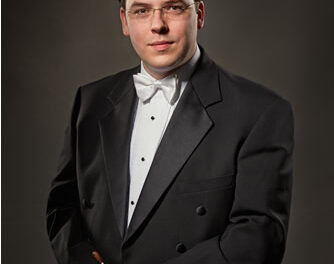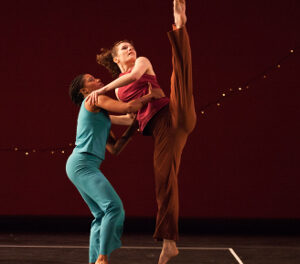It was quite a coup that the UNC Music Department was able to bring in Frederica von Stade, one of the most popular and versatile singers of the current “Golden Age of Mezzo-sopranos” that began during the last third of the twentieth century, on the William S. Newman Scholarship Series. This Francophile has treasured performances and recordings running the gamut from Berlioz through Debussy. Her mastery of French style has set the bar very high for other artists. The same is true for bel canto composers such as Rossini and Bellini. Her mastery of German Lieder has left a number of accomplished recordings of German Classical and Romantic composers such as Mozart and Mahler. Her athletic and slim figure has made her an ideal singing-actress for such “trouser roles” as Mozart’s Cherubino or Richard Strauss’ Octavian. She ventured into the world of HIP (Historically Informed Performance) with forays into the operas of Monteverdi and Rameau. Beside singing the works of Broadway composers, she has continued to inspire a wide range of contemporary composers such as Dominick Argento, Richard Danielpour, Jake Heggie, and Ned Rorem.
Since this concert series honors the memory of the great performer-scholar William S. Newman, it was especially apt that von Stade’s skilled accompanist was James Meredith (UNC’67). He was among the last of Newman’s piano students, and he is a musician of broad achievement including vocal teaching and extraordinary educational efforts on the behalf of disadvantaged youth. His two solo selections, one before intermission, and one after the end of the scheduled program, showed his chops could star as well as support!
The singer’s rich and varied program served as a sort of autobiography in music. She weighed about two pounds at birth – “the runt of the litter,” her mother said, but “with rosy lips.” The program opened with Ned Rorem’s sparse setting of “I Am Rose,” a straightforward text by the often experimental Gertrude Stein. von Stade’s early sojourn in Greece was portrayed by “La Vie En Rose,” a text by Edith Piaf scored by Margurite Monnot and Louis Guglielmi, and “Paper Wings,” a setting of a von Stade text set by Jake Heggie. An elegant performance of “Tout Gai!” from the well-known Cinq Melodies Populaires Grecques by Maurice Ravel ended the Greek theme.
A childhood spent in a Catholic convent school was evoked in “A Prayer to St. Catherine” by Virgil Thomson in which a child seeks for a cure to heartache and shyness. Next she sang Aaron Copland’s popular setting of a text by Emily Dickinson, “Why Do They Shut Me Out of Heaven?”
Instead of going straight to college, von Stade finessed a trip to France where she said she had been by turns, a sales clerk, a waitress, and a cleaning maid, while falling into love with Paris. Francis Poulenc’s setting of a text by Apollinaire, “Voyage à Paris,” (homage to the city) is the title of one of the singer’s most popular recordings and her performance was a model of stylish delivery. Rorem’s setting of a text by Hillyer, “Early in the Morning,” evoked the joys of a summer’s day in Paris.” Three selections from Les Jardins de Paris by Marc Berthomieu (texts by Daniel Schmitt) conjured three very different public gardens. “Square Georges Cain” seems to have had its origins in pebbles thrown at a cheating lover by his woman. “Jardins d’Albert Kahn” gave von Stade ample scope to portray the mini-drama of a young woman who falls in and out of love over the course of a walk in a Japanese garden. A recurring wedding march in the keyboard was just one of the humorous bits in “Bois de Boulognem” where some weddings may have been consummated before the ceremony. How solid could squirrels as witnesses be? (The Paris songs were dedicated to the memory of UNC’s Richard Luby.)
The first half of the concert ended with a solo performance by James Meredith of Frédéric Chopin’s Nocturne in C minor, Op. 48. The long elegant and serene opening suddenly rises to an almost Lisztian crescendo and octaves quite at odds to any thought of the form being about gentle night music. Meredith’s phrasing, peddling, and dynamic choices were excellent.
After intermission von Stade recalled the long gamut of auditions and vocal contests she endured before getting her big break. She chose to commemorate this period with Gustav Mahler’s “Lob des Hohen Verstands” from his Des Knaben Wunderhorn song cycle. A singing contest between the cuckoo and the nightingale is judged by the huge-eared ass. The old Dick Clark Band Stand spirit is recalled in the ass’s ruling in favor of the cuckoo because his song has “a beat!” This was a masterful combination of both vocal acting and body language to conjure up the comic trial. She said she did not want to imply any connection to judges who had not picked her! Her crucial Metropolitan Opera audition featured the famous Act III letter scene from Massenet’s Werther. The emotions of the scene were fully expressed and her vocal line was even across its dynamics and range. The recollection of her troubles with the lighting of the candle for this letter scene in a performance was most amusing.
To honor her two daughters and two granddaughters, von Stade chose Carol Hall’s “Jenny Rebecca,” “A Route to the Sky,” the 4th song in Jake Heggie’s Paper Wings (text by von Stade), and Giacomo Puccini’s “L’Ucellino.” The Heggie song recalled a true event in which the mezzo-mother followed her errant child out onto the roof only to need rescue by the fire department for both! She pulled out the stops to put across William Bolcom’s deliciously wicked “Amor.” Maurice Ravel’s “Nicolette” brought a French twist to a Red-Riding-Hood-and–the-Wolf type story. In a meadow, where Nicolette flees the attentions of a wolf with haste, and the attentions of a handsome man of modest means with reluctance. An ugly, rich, and smelly old lord accosts her and she rushes into his arms never to return to the meadow. This song encapsulated von Stade’s wonderful ability to put a story across to audiences. Mahler’s setting of Friedrich Rückert, “Ich bin der Welt abhanden gekommen” portrays the poet’s withdrawal from the noise of the world. The formal program ended with a performance of Stephen Sondheim’s “Send in the Clowns,” the raw emotional quality of which will long be remembered.
The enthusiastic Hill Hall audience was rewarded with three encores. A solo performance by Meredith of the Étude in A-flat, Op. 72, # 11, by Moritz Moszkowski (1854-1925) abounded with fast, seamlessly flowing melodies along with rapidly scurrying arpeggios and crossed hands. The first of von Stade’s two choices was “Greeting,” composed by Leonard Bernstein upon the birth of his son; the second was a musical “Foster Brooks” drunk routine but with elegance, the “Ariette de la griserie” from La Périchole by Jacques Offenbach (1819-80).
Note: For an interview from Opera Lively conducted during the artists’ visit to Chapel Hill, click here. And for a print edition of that interview, visit https://www.createspace.com/4228437.













